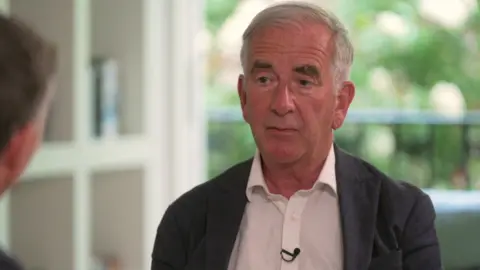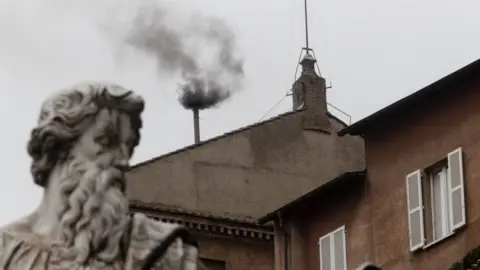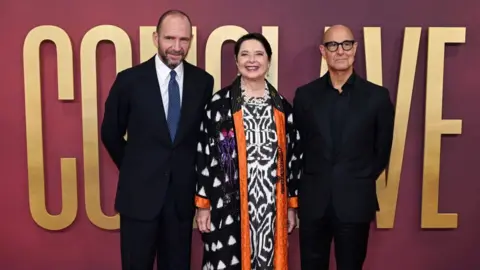Conclave author says papal selection is like The Traitors
 BBC
BBCThe bestselling novelist Robert Harris says a conclave to select a new Pope has a similar dynamic to hit TV show The Traitors.
The author of Conclave, which was last year turned into an Oscar-winning film adaptation, said the programme - in which "faithful" contestants are tasked with trying to work out the "traitors" among them - was "the nearest analogy I can come to".
"Suddenly everyone swings to one person - you can't see why, particularly, but it happens," he tells BBC News ahead of the election to replace Pope Francis, due to begin next week.
"And in a funny way, a similar dynamic does operate in a conclave, which is why often it produces a surprise."
But Harris argues that it is a process UK political parties should learn from.
The writer says his book and the subsequent film illustrates how the ancient, secretive ritual in the Sistine Chapel is a "rather brilliant device" for finding the right person to lead an organisation.
Only male cardinals under the age of 80 are entitled to participate. The voting is conducted in total privacy, with the news of a decision announced by white smoke emerging from a chimney on the chapel's roof.
Political parties throwing the election of their leaders open to the wider membership "has not produced very good results", Harris says.
It would be better if a select number "who have seen the candidates close up, day in, day out, choose who the leader should be", he adds.
He continues: "To lock the door and say you're not going to come out until you've come up with a result concentrates the mind - and if you look back, the popes have been pretty good.
"I didn't come away from researching the novel thinking this is a terrible idea [and that] I must write a novel to expose how awful it is. In a way, the novel shows a conclave working."
 Getty Images
Getty ImagesHowever, the Fatherland and Archangel author thinks it is strange that women are excluded from the Catholic priesthood and the election for a new Pope.
"Can any sophisticated religion, with such a huge following, really go on and on into the future with such a secondary, demeaning role for women?" he asks.
"I mean, it just seems odd. Would Christ really have only wanted his word to be spread by men?"
Harris says the character of Sister Agnes - a nun who speaks out during a crucial moment in his fictitious conclave - was a "vital" creation.
"I wanted to find some way of getting the female voice in this process, and the only way is the women who serve the meals, clean the rooms and run the hostel when the cardinals are there," he explains. "I really wanted to make them a part of the story."
Harris says that, while researching his novel about conclave, Pope Francis's office gave him permission to visit parts of the Vatican generally off-limits to outsiders.
"They showed me the most extraordinary things and allowed me to walk along the corridor to the balcony where the new Pope shows himself to the huge crowd in St Peter's Square," he recounts. "That was a breathtaking moment."
 Getty Images
Getty ImagesHarris says that, when piecing together the process of the conclave, he realised he had "stumbled on a treasure trove".
"I think that the conclave is a rather brilliant device for finding the right sort of person who can command the respect of the church."
"It's spiritual and human and political drama all woven into one," he says. "A conclave is as dramatic as the reading of a will. It's that level of natural drama."
After the publication of Conclave in 2016, Cardinal Cormac Murphy O'Connor - who had helped Harris with his research - asked for a copy in Italian to give to Pope Francis.
"I gave him the book and he said he thought the translation looked pretty good, but I don't know whether the Pope did read it. If he did, he didn't say anything to me."
